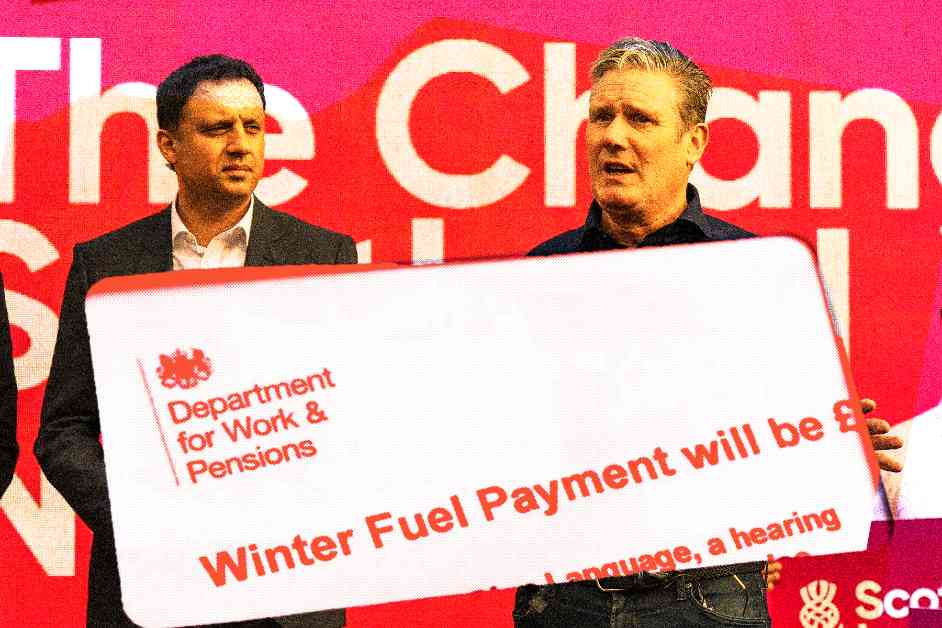Scottish Labour MPs’ Rebellion Over Winter Fuel Payment Cut
The issue of the winter fuel payment cut has sparked controversy among Scottish Labour MPs, with Stephen Flynn urging his colleagues to rebel against the decision in tomorrow’s Commons vote. However, the likelihood of such a rebellion actually materializing seems slim, given the political dynamics at play.
Rebellion Unlikely Among Scottish Labour MPs
While Flynn’s call for rebellion may sound bold, the reality is that the Scottish Labour MPs are unlikely to defy the party line. The upcoming vote on the cut to the winter fuel payment is a crucial moment for them, but the repercussions of going against the party whip are significant. Any MP who chooses to rebel risks facing consequences from party leadership, including having the whip removed.
Contrast with SNP’s Position on Free School Meals
In a parallel situation, the SNP faces a similar challenge with the upcoming vote on reversing the Scottish Government’s decision on free school meals. Despite the potential for dissent within the party, the likelihood of any SNP MSPs rebelling remains low. The political stakes are high, and party loyalty often prevails in such situations.
Differences in Parliamentary Votes
The nature of the votes in the Commons and the Scottish Parliament further highlights the differences between the two situations. While the Tory motion on the winter fuel payment cut in the Commons could impact policy changes, the opposition day motion on free school meals in Holyrood is more symbolic and lacks legislative impact. However, both votes serve as a test of party cohesion and commitment to their respective agendas.
Potential Consequences for Rebels
The consequences of rebellion in both parties are significant. Any Labour MP or SNP MSP who defies the party whip risks losing their standing within the party. The decision to rebel is not taken lightly, as it could have lasting implications for their political careers and relationships within their party.
Debate Over Policy Changes
The debate over policy changes, such as the shift from universal benefits to targeted benefits, is a contentious issue in both the winter fuel payment cut and the free school meals decision. The rationale behind these changes is often framed in terms of fiscal responsibility and the need to address budgetary constraints. However, the impact on vulnerable populations, such as pensioners and school children, cannot be overlooked in these discussions.
Challenges of Fiscal Responsibility
Both the Scottish Government and the UK government face challenges in balancing fiscal responsibility with social welfare initiatives. The need to make tough choices in allocating limited resources is a recurring theme in political decision-making. The pressures of addressing budget shortfalls while meeting the needs of the population create a complex policy landscape for policymakers to navigate.
Significance of Party Loyalty
The role of party loyalty in shaping political decisions cannot be underestimated. The pressure to adhere to the party line and support party policies is a key factor in determining how MPs and MSPs approach contentious votes. The balancing act between individual conscience and party discipline is a constant challenge for politicians in navigating the political landscape.
Potential Impact on Public Perception
The decisions made by political parties on key issues, such as winter fuel payments and free school meals, can have a significant impact on public perception. The public’s trust in political leaders and parties is closely tied to their ability to deliver on promises and address social welfare concerns. Any perceived backtracking on key policies could erode public confidence in the government’s ability to prioritize the needs of the most vulnerable in society.
The Role of Opposition Parties
The role of opposition parties, such as Labour and the SNP, in holding the government to account is crucial in shaping policy outcomes. By challenging government decisions and advocating for alternative approaches, opposition parties play a vital role in ensuring transparency and accountability in the political process. The pushback against unpopular policies, such as the winter fuel payment cut and the free school meals decision, highlights the importance of robust opposition within the political system.
Looking Ahead
As the debates over the winter fuel payment cut and the free school meals decision unfold, the political landscape in Scotland remains fluid. The outcomes of these votes will have far-reaching implications for pensioners, school children, and the wider population. The challenges of balancing fiscal responsibility with social welfare commitments will continue to shape political decision-making in the months ahead.
In conclusion, the upcoming votes on the winter fuel payment cut and the free school meals decision present significant challenges for Scottish Labour MPs and SNP MSPs. The balancing act between party loyalty and individual conscience, the impact on vulnerable populations, and the broader implications for public perception all underscore the complexity of the political landscape. As policymakers grapple with tough choices and navigate competing priorities, the need for transparency, accountability, and effective governance remains paramount in shaping the future of Scotland’s social welfare policies.
































